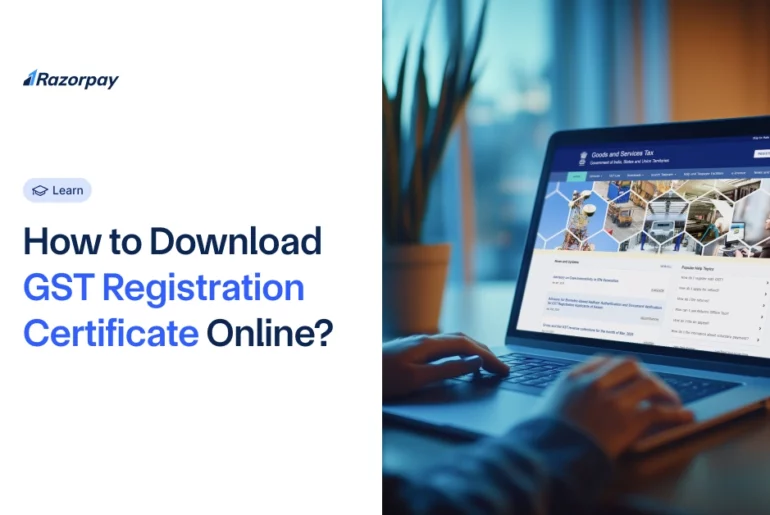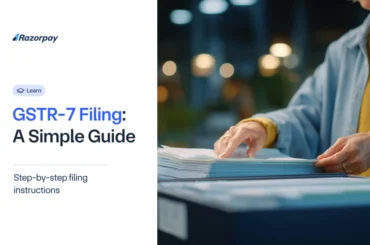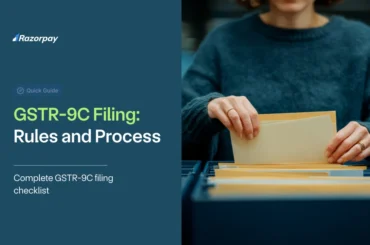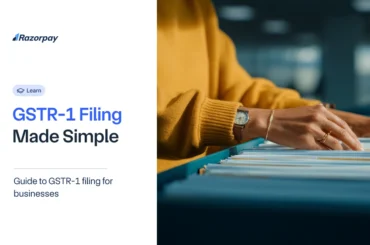Businesses in India must register for GST (Goods and Services Tax) if their annual turnover exceeds the threshold limit of ₹40 lakh (or ₹20 lakh for special category states). Certain categories of businesses, such as casual taxable persons, non-resident taxable persons, and those supplying goods or services through an e-commerce operator, must register for GST regardless of turnover.
The GST Registration Certificate (RC) is a crucial document as it serves as valid proof of registration under the GST law in India. Businesses must comply with GST registration threshold limits to avoid any legal issues and penalties.
Related Read: What Is a GST Clearance Certificate? How to Apply & Download It?
Table of Contents
Understanding the Purpose of the GST Registration Certificate
The GST Registration Certificate contains essential information, including the GST Identification Number (GSTIN) and details of the taxpayer’s principal and additional places of business. It is issued to various types of taxpayers covered under GST, such as regular taxpayers, TDS and TCS applicants, non-resident taxpayers, OIDAR service providers, and those who migrated from pre-GST laws.
Legally, businesses must display the GST registration certificate at their primary place of business and any additional place of business listed in the certificate. Failure to comply with this requirement can lead to penalties under CGST Rule 18(1). If you need to amend your GST registration details, you can easily update the information through the GST portal (https://www.GST.gov.in/) and obtain a fresh GST registration certificate.
Related Read: GST Registration Limits: Threshold limit for GST Registration for 2026
How to Download GST Certificate Online?
The GST Registration Certificate is available exclusively on the GST portal. Here’s the GST certificate download process:
Step 1: Log in to the GST portal using your credentials.
Step 2: Navigate to Services –> User Services –> View / Download Certificate.
Step 3: Click on ‘Download’ to complete the GST certificate download process.
Step 4: You can print the downloaded PDF document and display the certificate at all your business locations.
Exploring Alternate Methods for GST Certificate Download
The standard GST registration certificate download method is carried out via the GST portal. Alternative methods on how to get a GST certificate are listed below –
1. Authorised GST Service Providers
Some third-party service providers authorised by the GST Council offer services to download the GST RC.
-
Visit the service provider’s website and register or log in to your account.
-
Provide the necessary details, such as GSTIN or business information.
-
Follow the prompts to initiate the certificate download process.
-
The service provider will access the GST portal and fetch your certificate.
This method can be helpful for businesses that prefer outsourcing GST-related tasks or lack technical expertise. However, it may involve additional costs and potential security risks.
2. Mobile Applications
Several mobile applications developed by authorised service providers allow you to download the GST Registration Certificate.
-
Download the mobile app and log in using your GST credentials.
-
Navigate to the ‘Certificate’ section and initiate the download process.
-
The certificate will be saved on your mobile for viewing/sharing.
While mobile apps offer convenience, compatibility, and functionality across devices may vary and pose a challenge.
3. Offline Mode
In certain cases, you can request a physical copy of your GST registration certificate from the jurisdictional GST office.
-
Visit the nearest GST office and submit a written request with supporting documents.
-
Provide the necessary details, such as GSTIN or business information.
-
After verification, the GST office will issue a physical copy of the certificate.
Offline modes can be useful for businesses in remote areas or those with limited digital access, but the process may be time-consuming and subject to administrative procedures.
Validity of GST Registration Certificates
The validity period of the GST Registration Certificate in India is determined based on the date of liability to GST registration and the submission of the registration application within 30 days. It can also depend on the date of granting the certificate under CGST Rules 9(1), 9(3) and 9(5). If there are delays under CGST Rule 9(5), officers are obligated to issue the signed registration certificate within 3 working days.
The GST RC issued to regular taxpayers has no expiration date as long as the registration remains valid and is not surrendered or cancelled. However, for casual taxable persons, the certificate is valid for 90 days only. If you fall under this category, you must apply for an extension/renewal before RC expires.
Components of a GST Registration Certificate
1. Annexure-A:
It comprises your business’s GSTIN, legal name, trade name (if applicable), and additional places of business.
2. Annexure-B:
It includes the GSTIN, legal / trade names, and key information about proprietors, partners, karta, managing and whole-time directors, board of trustees, etc.
Example of a GST Registration Certificate
Advanced Tips for Safeguarding Your GST Registration Certificate
1. Strong Passwords:
Implement robust passwords for your GST portal account and any other related accounts. Use a combination of uppercase/lowercase alphabets, numbers, and special characters.
2. Two-Factor Authentication (2FA):
Enable 2FA whenever possible to add an extra layer of security to your accounts. This involves providing a second form of authentication, such as a one-time password (OTP) or biometric verification, in addition to your regular password.
3. Regular Monitoring:
Monitor your account activity and access logs to detect suspicious or unauthorised access attempts. Set up alerts to be informed of any unusual activity.
4. Encryption:
Ensure that any digital copies of your GST RC are stored and transmitted using strong encryption methods.
5. Software Updates:
Keep your operating systems, web browsers, and related software up-to-date with the latest security patches. These updates often address vulnerabilities and improve overall security.
6. Secure Networks:
Use secure and trusted networks when accessing or downloading your GST Registration Certificate. Avoid public or unsecured Wi-Fi networks, which can be more susceptible to scams.
7. Employee Training:
Provide regular cybersecurity awareness training to your employees, emphasising the importance of protecting sensitive business information, including the GST RC.
What is the Time Limit / Validity of the Registration Certificate for GST?
The time limit or validity period of the GST Registration Certificate varies depending on the type of registration and the specific circumstances of the business. According to the GST regulations, the validity period is as follows:
1. Regular Taxpayers:
The GST Registration Certificate does not have a fixed validity period for regular taxpayers. The certificate remains valid as long as the registration is active and not surrendered/cancelled by the taxpayer, or revoked by the GST authorities.
2. Casual Taxable Persons:
The GST Registration Certificate is valid for 90 days from the effective date of registration. If the casual taxable person needs to continue their operations beyond the 90-day period, they must apply for an extension or renewal of the registration before the expiry date.
3. Non-Resident Taxable Persons:
Their GST RC is valid for a period specified in the registration certificate itself or 90 days from the effective date of registration, whichever is earlier.
4. Input Service Distributors (ISD):
In this case, the GST Registration Certificate does not have a fixed validity period and remains valid as long as the ISD registration is active and not cancelled.
5. E-commerce Operators:
The GST RC is valid until the registration is cancelled or revoked by the GST authorities.
It’s important to note that factors, such as compliance with GST regulations, timely filing of returns, payment of taxes, and adherence to turnover thresholds, may also influence the validity period.
For example, consider a seasonal business operating only during festival periods. Such a business might register as a casual taxable person, obtaining a GST registration valid for the duration of the festival season. Conversely, a regular retailer with a continuous turnover above the threshold will hold an indefinite GST registration, subject to compliance with GST regulations.
Case Studies: Real-life Examples of How GST Registration Certificate Impacts Businesses
1) Eligibility for Input Tax Credit: Tata Steel
Tata Steel, one of India’s leading steel manufacturers, faced complex tax structures and a significant tax burden on raw materials prior to the implementation of GST.
1. Impact of GST Registration:
With GST registration, Tata Steel could claim input tax credit (ITC) on the goods and services used in its production processes. This allowed the company to offset the GST paid on inputs against the GST collected on outputs.
2. Benefits Realised:
Cost Savings: Substantial savings by reducing the cascading effect of taxes led to a reduction in the overall tax burden.
3. Improved Cash Flow:
Enhanced liquidity as ITC claims streamlined tax payments and refunds.
4. Increased Competitiveness:
Lower production costs translated into more competitive pricing in both domestic and international markets.
2) Participation in Government Tenders: L&T (Larsen & Toubro)
Larsen & Toubro, a major player in engineering and construction, aimed to increase its footprint in government infrastructure projects. However, navigating the pre-GST tax landscape was challenging.
1. Impact of GST Registration:
Post-GST, L&T’s registration enabled it to comply seamlessly with the tender requirements for government contracts.
2. Benefits Realised:
Business Expansion: Secured several high-value government projects, contributing significantly to its revenue growth.
3. Reputation Boost:
Compliance with GST improved L&T’s reputation as a reliable and transparent contractor.
4. Revenue Growth:
Saw a notable increase in revenue, with government projects contributing to a significant portion of its annual income.
3) Smoother Interstate Transactions: Flipkart
Flipkart, a leading e-commerce giant in India, dealt with various state taxes that complicated its logistics and operations across the country.
1. Impact of GST Registration:
The introduction of GST simplified the tax regime for interstate transactions, significantly benefiting Flipkart’s nationwide operations.
2. Benefits Realised:
Simplified Taxation: GST replaced multiple state taxes with a uniform tax structure, simplifying compliance and reducing administrative burdens.
3. Operational Efficiency:
Streamlined tax processes led to an increase in operational efficiency, as per internal assessments.
4. Enhanced Customer Reach:
Smoother logistics enabled Flipkart to expand its customer base, improving delivery times and service quality.
Conclusion
Obtaining the GST downloadable RC is easy and allows you to ensure compliance with tax regulations. The digital availability of the GST certificate promotes transparency and saves time, allowing you to streamline your taxation procedures and avoid potential penalties. Remember, staying updated with the latest GST compliance measures and leveraging digital solutions are crucial for maintaining efficient business operations in today’s fast-paced environment.
Frequently Asked Questions (FAQs):
1. What information is included in a GST registration certificate?
A GST RC includes the GSTIN, trade name, legal name, type of business constitution, principal place of business address, date of liability, validity period, type of registration, approving authority particulars, and the date of issuance.
2. What is the validity period of a GST registration certificate?
For regular taxpayers, the GST registration certificate does not have an expiration date. However, for casual taxable persons, the certificate is valid for 90 days, after which extension or renewal is required to prevent cancellation of GST registration.
3. What are the consequences of not having a GST registration certificate?
Not having a valid GST registration certificate can lead to penalties and legal consequences, as it is a mandatory requirement for businesses exceeding the GST registration threshold limit or falling under specific categories.
4. How long does it take to receive a GST registration certificate after applying?
After you have applied for the GST RC, you can expect to receive it within 7-10 working days.
5. Can I download a digital copy of my GST registration certificate?
Yes, the GST RC can be downloaded from the official GST portal.
6. Can I download the GST certificate using my PAN?
No, downloading the GST certificate online requires logging in to the GST portal using your GST credentials, not your PAN.
7. Where can I download the GST certificate on the GST portal?
On the GST portal, navigate to the ‘Services’ tab, select ‘User Services’, and then click on ‘View/ Download Certificate’ to access and download GST certificate.
8. Is there a fee for downloading the GST certificate?
No, there is no fee associated with downloading the GST registration certificate from the GST portal.
9. What if I can’t download my GST certificate?
If you encounter any issues while downloading your GST certificate, you can contact the GST helpdesk or seek assistance from a qualified professional for further guidance.





